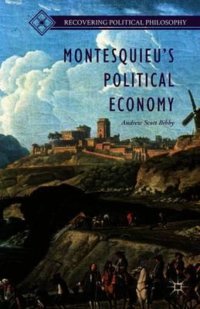Recovering Montesquieu’s Political Liberalism

Montesquieu’s Political Economy. Andrew Scott Bibby. New York: Palgrave MacMillan, 2016.
Part of Palgrave’s Recovering Political Philosophy series, Andrew Scott Bibby’s Montesquieu’s Political Economy presents the French philosopher as a liberal who defends private property, liberty, and religion rather than as a defender of monarchial privilege. By revisiting Montesquieu’s argument for the political importance of commerce, Bibby uncovers Montesquieu’s defense of venality, the attempt to make commerce honorable, as a means to promote upward social mobility. However, for Bibby, Montesquieu’s defense of commercial civilization is incomplete and needs religion and private property to support such a legitimization. Those opinions and practices that do not support liberty and commerce are labeled as extremist and therefore have no place in Montesquieu’s politics.
The book consist of six chapters with an introduction, conclusion, bibliography, and index. The introduction outlines the aims of the book: to present Montesquieu’s economic ideas as they relate to his political philosophy of liberalism and to argue that, contrary to the predominant view in the scholarship about Montesquieu, The Spirit of the Laws possesses a design that gives coherence to the work, with commerce playing a central role in the cultivation of liberty. By focusing on Montesquieu’s political economy, Bibby hopes to show how Montesquieu’s economic writings clarify rather than confuse his political philosophy of liberalism.
Chapter one reviews Montesquieu’s life and how his writings on commerce and economics play a significant role in his thought. What emerges from his notebooks and earlier writings like Persian Letters is an economic theorist who is interested in topics like public debt, banks, and commerce as they relate to virtue and liberty. This relationship between economics and politics comes to the forefront of Montesquieu’s mind when he embarks on a three-year voyage to Austria, Hungary, Italy, Germany, the United Provinces, and England. Evaluating the merits and weaknesses of each society he visits, Montesquieu, according to Bibby, begins to see the full significance of the relationship between commerce, religion, and liberty.
Whereas chapter one is broad in its investigation, chapter two is narrow with a focus on Montesquieu’s writing on commerce – its causes, consequences, and account of human nature – in book 20 of The Spirit of the Laws. Bibby also shows that Montesquieu is not simply a partisan of commercial England but sees it as a preferred ideal when compared to Marseilles (commercial but not free) or Holland (commercial and free but with primitive institutions). England has been able to balance commerce, liberty, and religion together so that “mores are relaxed and commercialized, religion is privatized and moderated, and institutions take over for virtue; the end result is liberty” (52). Commerce therefore is not a “grand panacea” for Montesquieu as some scholars have claimed but a necessary variable, along with religion and private property, for a regime to secure liberty.
In the next chapter, Bibby examines the Montesquieu’s politics of free trade, public credit, trading companies, banks, and regulations of business and commerce. From these writings emerges Montesquieu’s defense of venality. This defense of upward social mobility not only would transform France’s second estate but would change French views of honor, reversing the prejudice against commerce (and agriculture) as ignoble professions. Unfortunately for Montesquieu, and for France, his proposal was not perceived as a commanding argument in French high culture, leaving the reputation of the French commercial class as one of self-interest rather than honor.
Chapter four reviews Montesquieu’s history of commerce in book 21 of The Spirit of the Laws. According to Montesquieu, the decline and revival of commerce is due to the invention of the “letters of exchange” as a cure for the disease of “Machiavellianism.” However, it becomes clear to Montesquieu that this cure is incomplete, requiring the additional elements of religion and private property to provide a defense of commercial civilization. In chapter five, Bibby surveys three interpretations of Montesquieu’s views of religion: 1) the endorsement of commerce is part of a strategy to emasculate religion; 2) commerce and religion share the same roots and therefore can possibly reconcile or synthesize; and 3) religion, like commerce, is understood by Montesquieu not as a philosophical matter but simply as a sociological one. Bibby believes the second reading of Montesquieu is most persuasive: while Montesquieu clearly views commerce as a way to combat religious extremism, it also seems implausible that he sees secularization as a long-term objective. Montesquieu’s comparative analysis of religion suggests that he wants to have modern liberalism be able to arbitrate on reasonable grounds between religions that support commerce and liberty and those that do not.
The final chapter investigates Montesquieu’s views of property and civil law, arguing that Montesquieu understood property as an extension of the person rather than an object of mere convention. Private property is understood as a natural right and self-ownership for Montesquieu whether in the areas of marriage, inheritance, or his critique of paternalism. Contrary to those who read Montesquieu as a conservative or defender of monarchy, Bibby shows that a re-examination of Montesquieu’s views of property places him in more of the camp of the liberals.
Montesquieu’s Political Economy makes a significant contribution to our understanding of Montesquieu not only as an economic theorist but as a political thinker who sought to combat the evils of his day: economic stagnation, religious extremism, and political liberty. By focusing on the topic of political economy, Bibby illuminates the relationship between politics and economics in Montesquieu’s thought and what we today can learn from it. For those who are not only interested in Montesquieu but care about contemporary concerns like religious extremism, political liberty, and economic vitality, Montesquieu’s Political Economy is a book to read.




